 Petzlover
Petzlover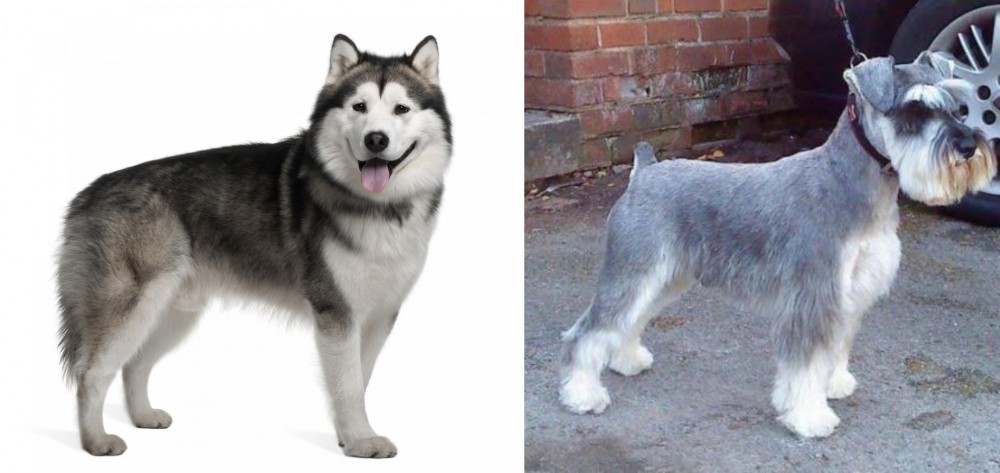 Alaskan Malamute is originated from United States but Miniature Schnauzer is originated from Germany. Alaskan Malamute may grow 28 cm / 12 inches higher than Miniature Schnauzer. Alaskan Malamute may weigh 29 kg / 64 pounds more than Miniature Schnauzer. Both Alaskan Malamute and Miniature Schnauzer has same life span. Both Alaskan Malamute and Miniature Schnauzer has same litter size. Alaskan Malamute requires High Maintenance. But Miniature Schnauzer requires Moderate Maintenance
Alaskan Malamute is originated from United States but Miniature Schnauzer is originated from Germany. Alaskan Malamute may grow 28 cm / 12 inches higher than Miniature Schnauzer. Alaskan Malamute may weigh 29 kg / 64 pounds more than Miniature Schnauzer. Both Alaskan Malamute and Miniature Schnauzer has same life span. Both Alaskan Malamute and Miniature Schnauzer has same litter size. Alaskan Malamute requires High Maintenance. But Miniature Schnauzer requires Moderate Maintenance
 Alaskan Malamute is one of the oldest breeds. Thousands of years ago, native people in the land between Alaska and Siberia. From the beginning, this breed is used as working dogs. Alaskan Malamute was a perfect dog for seal or bear hunting, and sledding supplies back home. During the gold rush, this breed became even more popular, and that popularity only grew over the years. They have been popular even during the war years. Army used them as sled dogs in the war.
Alaskan Malamute is one of the oldest breeds. Thousands of years ago, native people in the land between Alaska and Siberia. From the beginning, this breed is used as working dogs. Alaskan Malamute was a perfect dog for seal or bear hunting, and sledding supplies back home. During the gold rush, this breed became even more popular, and that popularity only grew over the years. They have been popular even during the war years. Army used them as sled dogs in the war.
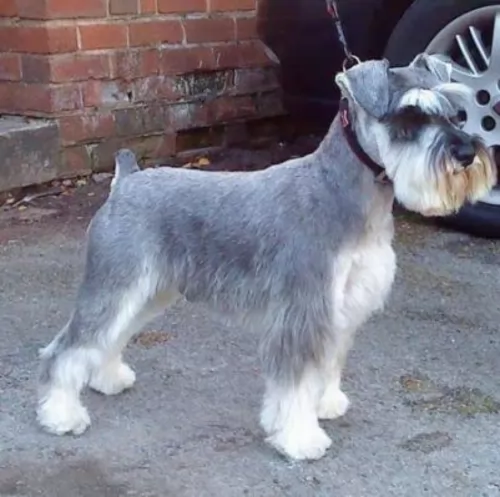 Miniature Schnauzers were first bred in Germany in the 19th century being bred from Affenpinschers and Standard Schnauzers.
Miniature Schnauzers were first bred in Germany in the 19th century being bred from Affenpinschers and Standard Schnauzers.
This dog was always used to control rats on farms, but these days he is more a companion. It is believed that the start of the modern Miniature Schnauzer in the United States was around 1924 when dogs were imported from Germany.
It was in 1933 that the Miniature Schnauzer was recognized by the AKC as a separate breed from the Standard Schnauzer.
 Average weight of Alaskan Malamute variates from dog to dog, but male weights 37-39kg, while female weight is 32-34kg. An average height of the male is 62-64cm, while females are slightly smaller with a height of 56-58cm.
Average weight of Alaskan Malamute variates from dog to dog, but male weights 37-39kg, while female weight is 32-34kg. An average height of the male is 62-64cm, while females are slightly smaller with a height of 56-58cm.
A lifespan of this breed is 12-15, but if your dog is healthy with the balanced diet they tend to live much longer.
Litter Size of Alaskan Malamute is 4-8 puppies, but this depends on every dog.
Other Names for Alaskan Malamute are Mal and Mally
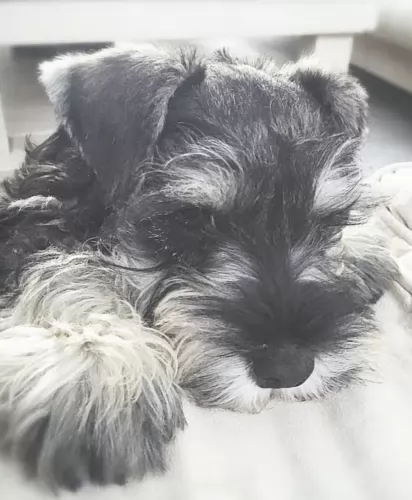 The Miniature Schnauzer is a small dog breed that stands between 30 to 36cm in height and weighs between 5 and 10kg.
The Miniature Schnauzer is a small dog breed that stands between 30 to 36cm in height and weighs between 5 and 10kg.
He has a sturdy body with a dense, wiry coat which most people prefer to have stripped. Because stripping is quite tedious, many of these dog owners prefer to have the coat clipped which actually gives the coat a greyish look to it.
The coat is usually a mix of black and silver. Some people refer to the Miniature Schnauzer as having a salt-and-pepper coat – hairs that are a mix of black and white. The dog has a double coat with the outer coat being wiry and the undercoat being a lot softer.
This is a dog that will need to be groomed frequently to prevent matting. A noticeable feature with these dogs is the rectangular shaped head with alert slanted eyes and bushy eyebrows, mustache and beard. In fact the word ‘Schnauzer’ means beard or muzzle.
The ears have been traditionally cropped but these days they are left and then they tend to be half-erect, half-floppy.
This is a tough little dog, fearless, cheeky, arrogant, alert and also friendly. A draw-card with him is that he is considered as a low-shedder and being hypoallergenic.
They’re very intelligent dogs too and will learn quickly when you give him training and socialization. This is important for a dog like this as he can quickly show you that he is strong willed and independent. Training and socialization makes him much nicer as he becomes more balanced and obedient.
He is full of life and extroverted and you can count on him to join you wherever you are and whatever you’re doing. Whether watching TV, swimming or hiking, he’ll be there and turn every occasion into a festive event. He is a loving, loyal dog, making a splendid pet.
He's protective of his human family and tends to be suspicious of strangers, and this is what makes him such a great watchdog.
 Alaskan Malamutes are playful dogs that love running, playing and spending time outside with their family. They would greet anyone who comes to your house, no matter if they are first-time visitors. That makes them bad watchdogs. Since they are a pack breed, they love spending time with humans and they love being included in activities. Generally speaking, they are great with children. They have a lot of patience for the little ones in your family. If they are socialized properly, you will not have any problems with other animals. They love playing and spending time running around, so you will not have to worry. They might run towards cats, so you have to be careful. Alaskan Malamute is not very easy to train because they are very intelligent and stubborn breed. Not very recommendable for new owners. The best way to train your puppy is with patience, consistency and positive awarding. They do not like the old-fashioned way of punishment with beating included. Instead, rather try being positive and give your dog nice treat when the task is completed.
Alaskan Malamutes are playful dogs that love running, playing and spending time outside with their family. They would greet anyone who comes to your house, no matter if they are first-time visitors. That makes them bad watchdogs. Since they are a pack breed, they love spending time with humans and they love being included in activities. Generally speaking, they are great with children. They have a lot of patience for the little ones in your family. If they are socialized properly, you will not have any problems with other animals. They love playing and spending time running around, so you will not have to worry. They might run towards cats, so you have to be careful. Alaskan Malamute is not very easy to train because they are very intelligent and stubborn breed. Not very recommendable for new owners. The best way to train your puppy is with patience, consistency and positive awarding. They do not like the old-fashioned way of punishment with beating included. Instead, rather try being positive and give your dog nice treat when the task is completed.
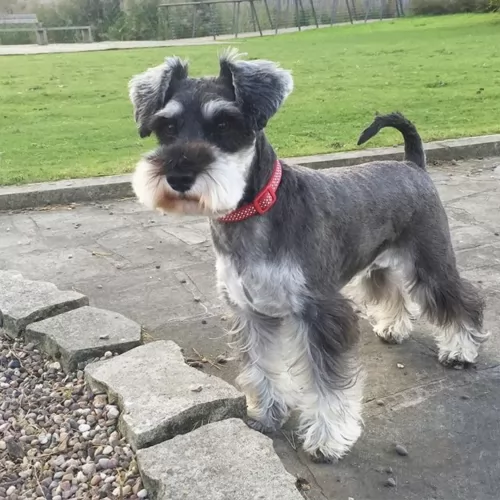 Miniature Schnauzers are such adaptable little dogs, quite happy to make a home with you in the city or in the countryside.
Miniature Schnauzers are such adaptable little dogs, quite happy to make a home with you in the city or in the countryside.
They’re sociable dogs, so just being with his human family wherever they are will suit him well. If he lives in the city however, he will need to have a walk everyday or taken to the park for a run.
He is also a dog that scarcely sheds, so he suits people battling with allergies. With an average life expectancy of 12 to 14 years, if you nurture your Mini Schnauzer and give him the best food and exercise there is, as well as loving him, you’re going to have a loyal and devoted pet.
 Usually Alaskan Malamute is a very healthy breed. They do not have any major issues but like every other breed, they can develop some illness. Cataracta, Chondrodysplasia, and hip dysplasia are the most common health issues, but you shouldn’t be worried because they are not happening all the time. You must talk with people who are giving you the puppy to examine the genetics. With healthy breed, and regular vet checks you will have a happy and a healthy dog for a long time.
Usually Alaskan Malamute is a very healthy breed. They do not have any major issues but like every other breed, they can develop some illness. Cataracta, Chondrodysplasia, and hip dysplasia are the most common health issues, but you shouldn’t be worried because they are not happening all the time. You must talk with people who are giving you the puppy to examine the genetics. With healthy breed, and regular vet checks you will have a happy and a healthy dog for a long time.
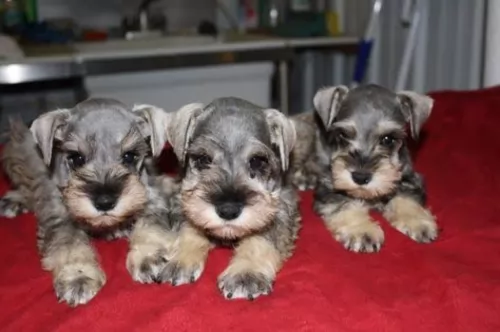 Your Miniature Schnauzer is pretty healthy and he isn’t likely to cost you much in terms of vet fees. There are however some common dog problems that you want to be aware of such as cataracts of the eye and hypothyroidism.
Your Miniature Schnauzer is pretty healthy and he isn’t likely to cost you much in terms of vet fees. There are however some common dog problems that you want to be aware of such as cataracts of the eye and hypothyroidism.
This a a problem in the lens of the eye. The lens should be clear, and when a dog has a cataract, it obscures the vision. The size of the cataract can lead to blindness.
Diabetes in a dog can bring on cataracts as can genetics or damage to the eye from exposure to ultraviolet light. Fortunately, dogs with cataracts can still see. Dogs with old cataracts can have surgery to remove them.
When a dog owner suspects a cataract in their pet’s eye it is best to treat it immediately with anti-inflammatory dog cataract eye drops. Cataracts never go away however without surgery.
The thyroid gland in the neck produces a hormone called thyroxine. It controls metabolism, but with hypothyroidism, enough of the hormone isn’t made. Its a common disease which affects all dog breeds.
Signs of hypothyroidism include hair loss, weight gain, intolerance to cold and a troublesome skin. To have the disease diagnosed, the vet will do a series of blood tests.
 Feeding of your Alaskan Malamute depends on various things. Metabolism, size of the dog, age, quality of the food, build and activity. So you have to understand your dog's needs. Overall, 4-5 cups of high-quality dry food would be enough. Of course, you can give your dog some fruit or vegetables too, as a treat. If your dog likes to spend most of the day on the couch, you don’t have to feed it as much as people who have more active dogs.
Feeding of your Alaskan Malamute depends on various things. Metabolism, size of the dog, age, quality of the food, build and activity. So you have to understand your dog's needs. Overall, 4-5 cups of high-quality dry food would be enough. Of course, you can give your dog some fruit or vegetables too, as a treat. If your dog likes to spend most of the day on the couch, you don’t have to feed it as much as people who have more active dogs.
Developing puppies need more food than an adult dog. They should eat 3-5 times per day, of high-quality puppy food. Puppy food contains more nutrient that will help to develop your dog into a healthy adult.
Grooming Alaskan Malamute may be little challenging. They have a lot of hair, so regular brushing is a must. 2-3 times a week at least. They shed a lot 2 times a year, and you will have to use vacuum-cleaner every day.
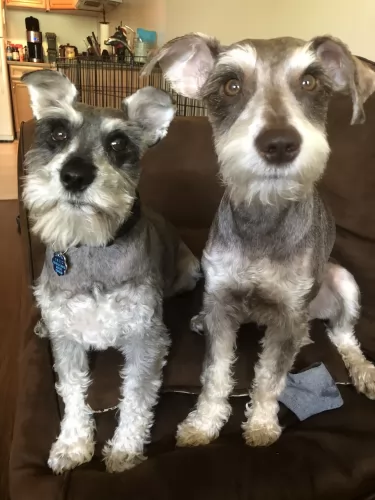 Let’s look at several ways you need to care for your Miniature Schnauzer -
Let’s look at several ways you need to care for your Miniature Schnauzer -
Make sure you have his puppy injections on time. This means knowing which veterinarian you’ll use. Later on if you don’t want to go in for breeding, you will need to have your pet spayed or neutered.
Make sure you have a nice warm, dry spot for your dog to sleep. It can be a cardboard box, or you can buy a dog basket or sleeping platform. Make sure your pet loves it and knows he can retreat to it anytime he wants.
If he goes outside for a few hours, make sure that he has a place to lie in the shade and away from the elements.
Good food promotes good health and longevity. You can feed your pet one of the top quality commercially manufactured foods and give your pet some variety by adding in some boiled chicken, vegetables and brown rice. Some raw meat occasionally can also be excellent for your pet.